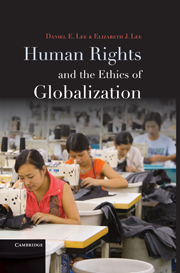Book contents
- Frontmatter
- Contents
- Preface
- Prologue
- Part I Philosophical Foundations
- Part II Practical Applications
- 4 Human Rights and the Ethics of Investment in China
- 5 Liberia and Firestone
- 6 Free Trade, Fair Trade, and Coffee Farmers in Ethiopia
- 7 Maquiladoras
- Part III The Challenge of Enforcement
- Epilogue
- Select Bibliography
- Index
7 - Maquiladoras
Exploitation, Economic Opportunity, or Both?
Published online by Cambridge University Press: 05 June 2012
- Frontmatter
- Contents
- Preface
- Prologue
- Part I Philosophical Foundations
- Part II Practical Applications
- 4 Human Rights and the Ethics of Investment in China
- 5 Liberia and Firestone
- 6 Free Trade, Fair Trade, and Coffee Farmers in Ethiopia
- 7 Maquiladoras
- Part III The Challenge of Enforcement
- Epilogue
- Select Bibliography
- Index
Summary
The factories in Mexico commonly known as “maquiladoras” are assumed by many to be a by-product of the North American Free Trade Agreement (NAFTA). Such, however, is not the case, though, as will be noted in this chapter, NAFTA did contribute to rapid expansion of maquiladoras – and to the controversy surrounding maquiladoras. In part, the controversy surrounding maquiladoras stems from a belief that maquiladoras have cost many U.S. workers their jobs as U.S. companies shifted production to low-wage factories south of the border in an effort to gain a competitive advantage in an increasingly competitive global economy. And in part, the controversy surrounding maquiladoras involves widespread allegations about substandard wages, unhealthy working conditions, and other exploitative practices.
In 1965 – three decades before NAFTA – the government of Mexico established the maquiladora program as part of that country’s Border Industrialization Program (BIP), a program instituted to develop employment opportunities for Mexican workers displaced by the 1964 termination of the Bracero Program, a guest worker program that had been introduced in 1942 to deal with critical World War II labor shortages in the United States in the agricultural and rail sectors. Under the terms of the maquiladora program, foreign-owned companies were allowed to import temporarily raw materials and components duty free for processing or assembly by Mexican workers with the resulting products to be exported, primarily to the United States. (“Maquiladora” is a term derived from the Spanish word “maquilar,” which means “to assemble.”)
- Type
- Chapter
- Information
- Human Rights and the Ethics of Globalization , pp. 159 - 198Publisher: Cambridge University PressPrint publication year: 2010



